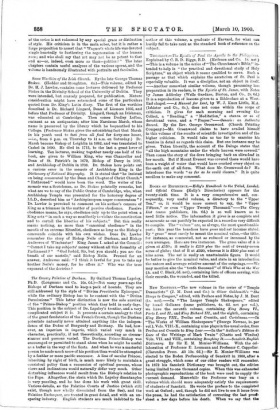The County Palatine of Durham. By Gaillard Thomas Lapsley, Ph.D.
(Longmans and Co. 10s. 6d.)—Not many years ago the Bishops Of Durham used to keep a pack of hounds. They are still addressed by the style of "Divina Providentia Episcopus," while the ordinary Bishop has to be content with the "Divine Permiasione." This latter distinction is now the sole survival of the " Prince-Bishop " position which they held in early days. This position is the subject of Dr. Lapsley's treatise, and a very complicated subject it is. It presents a certain analogy to that of the great feudatories of the French Crown, though the Durham potentate naturally never attained anything like the indepen- dence of the Dukes of Burgundy and Brittany. He had, how- ever, an imperium in imperio, which varied very much in character, practically, if not theoretically, according as circum- stances and persons varied. The Durham Prince-Bishop was encouraged or permitted to stand alone when he might be useful as a buffer in the way of the Scots. And when he was a masterful person he made much more of his position than would be attempted by a feebler or more pacific successor. A line of secular Princes, inheriting by right of birth, is much more likely to maintain a consistent policy than a succession of spiritual persons, whose views and inclinations would naturally differ very much. Other disturbing influences would result from the Bishop's relation to the Pope. Altogether, the skein which Dr. Lapsley disentangles is very puzzling, and he has done his work with great skill. Various details, as the Palatine Courts of Justice (which still exist, though now wholly dissociated from the See), and the Palatine Exchequer, are treated in great detail, and with an un- sparing industry. English 'students are much indebted to the author of this volume, a graduate of Harvard, for Nsha.t can hardly fail to take rank as the standard book of reference on th subject.






































 Previous page
Previous page